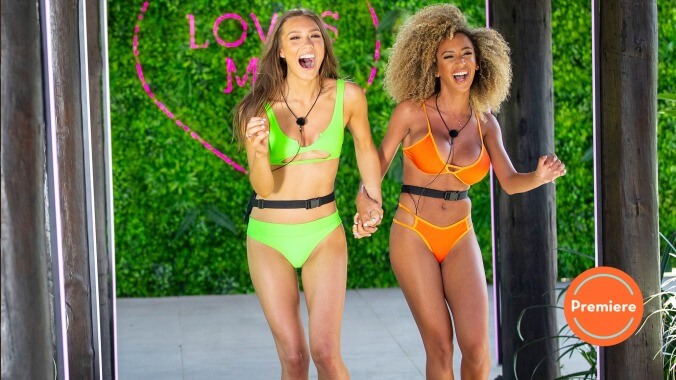Alexandra Stewart and Caroline “Caro” Viehweg Photo: Colin Young-Wolff
No one on Love Island is under any illusions about what they’re doing. The opening narration of CBS’ American import of the massively popular British show characterizes the show as “Big Brother meets The Bachelor,” but even that feels like too complex a description: Love Island is about a bunch of hot people sitting by a pool bonding over the fact that they have nothing to do, complaining about each other and the fact that they have nothing to do, and boning.
It’s great.
CBS’ version introduces 11 contestants, forces them to pair up into five couples, and sets them free to roam around the Fiji villa setting. At the end of the season, one couple—which might include two of the initial islanders, one, or none—will win a cash prize. That’s about it.
American reality dating shows like The Bachelor franchise frequently go high concept in their pursuit of fairytale romance. It’s impossible not to see the strings being pulled, even when you want to suspend disbelief. The producers of Love Island, on the other hand, want you to know that the strings are there, and they are being pulled precisely.
On their own, most of the Love Island challenges are exceedingly simple. The housemates might take a “lie detector test.” They might guess which means tweets are about which other housemates. They might be taken from the villa in the middle of the night and sent to meet several new singles. Or they might just play “fuck, marry, kill” in the form of “snog, marry, pie.” All of these are brutally efficient in the way they’re designed to stir up conflict.
Add that to the pacing—Love Island airs almost every day, with each episode turned around rapidly—and you get a show that alternates between people doing nothing and people doing everything. If the extremely nice Japanese reality show Terrace House is lawful good in a traditional Dungeons & Dragons alignment chart (and it is), then Love Island is pure chaotic evil.
It’s still too early to say whether the American Love Island will find its rhythm and be as mesmerizing as the original, especially since there haven’t been any full-on challenges yet. Judging by the first episode, it will be somewhere in the vicinity of “totally fine.”
The American version of Love Island faithfully mimics most of the important, superficial aspects of the original: the ear-worm techno transition music, the “surprise” introduction of new contestants, the phone on which the islanders receive messages from the producers, the sense that all of this has been thrown together in a day, because it has.
Some of the other elements that make the British Love Island work so well don’t quite translate on this side of the Atlantic. Arielle Vandenberg seems pretty decent as a host, and more than willing to be the butt of the joke, but it’s unclear if she’ll be as much of a presence as Caroline Flack. The identity of the American narrator was kept under wraps for some reason, though it’s not like the production went the stunt casting role—but Matthew Hoffman doesn’t reach the ridiculously smarmy heights of Scottish comedian Iain Stirling, whose voiceover work, more than anything else, defines the show. (The lack of accents doesn’t help this version of the show.)
Giving the premiere an hour and a half to breathe a bit works, leaving enough time to introduce the islanders, spend a brief moment watching them interact, and set up a cliffhanger for the end: which man will new islander Kyra choose to couple up with, stealing them from one of the other women?
None of the members of the house make an incredibly strong impression, but there’s a lot of room to grow. There’s Zac, a seeming player type who lives with his three sisters and his mother. There’s Mallory, who is basically looking to date John Mayer and gives off strong early 2000s Cameron Diaz vibes. But no one is gripping right off the bat.
In some ways, American Love Island feels almost tame. The women spend a big chunk of the episode scheming ways to “keep their men,” in language that wouldn’t sound out of place coming from Scheana on Vanderpump Rules. But Vanderpump Rules this is not.
When islander Kyra casually drops that her last relationship was with a woman, Yamen—the man who seems to be most in demand—freaks out. He’s eventually fine and mostly calm, but watching someone act as if it’s a huge deal that a potential partner might be bisexual feels a bit staid. And it makes for an especially poor contrast with the current season of Are You The One? which, in throwing open its doors to a crew of entirely sexually fluid contestants, has exponentially increased the potential for drama. Watching only five couples with one set of possible pairings? How quaint.

 Keep scrolling for more great stories.
Keep scrolling for more great stories.
